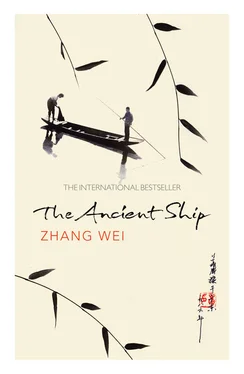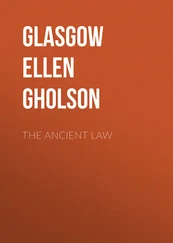Several days later Li Zhaolu returned from the northeast. After a year of trying to make a living far from home, his skin had taken on a gray pallor and his cheekbones were more prominent. He said he planned to go back, and he’d only returned home to start a family. So he spent a month in Wali, after which he said, “That’ll do it,” and headed back to the northeast. This time he did not return. News of his death arrived six months later. He had been buried in a coal mine cave-in. His widow, Xiaokui, was no longer willing to step foot beyond Zhao Family Lane. Then one day Baopu spotted a woman in mourning apparel. Xiaokui.
Xiaokui gave birth to little Leilei. Meanwhile, Baopu’s health deteriorated, until one day he fell seriously ill. Guo Yun checked his pulse and his tongue, then examined his arms and his back. Lesions had broken out on the skin, he was feverish and thirsty, uncontrollably agitated, and his tongue had changed color. The old man sighed. “The unhealthy external heat has not dissipated,” he said, “and the unhealthy internal heat has risen. The outer and inner heats feed off each other, disrupting the state of mind and internal organs.” He then wrote out a prescription, which Baopu took for several days, improving his condition somewhat, although the lesions did not go away. So Guo Yun gave him a prescription for them: two taels of raw gypsum, three tenths of a tael of glycyrrhiza, three tenths of a tael of figwort, four tenths of a tael of bluebell, a tenth of a tael of rhinoceros horn, and a tael of nonsticky white rice. Baopu followed the healer’s instructions meticulously; once he was on the road to recovery he looked through some medical books. He discovered that Guo Yun had used a formula that produced only temporary benefits and was not a cure. When he asked if that was true, Guo Yun nodded and said yes, stressing the importance of serenity and a moderate use of herbs and tonics. What mattered was breathing exercises and a calm spirit. Baopu met this with silence, firm in his belief that any member of the Sui clan who contracted this illness had no hopes of ever being cured.
Every few days Baopu suffered from insomnia, tossing and turning restlessly, as he had for nearly twenty years. He would get up and walk in the compound, though now he avoided standing beneath Xiaokui’s window. In his imagination he heard Li Zhaolu banging the strainer, he heard the collapse of the mine, and he heard Li Zhaolu’s cries for help. He also saw a look of denunciation in the man’s eyes from beyond the grave. With Xiaokui’s mourning garments floating before his eyes, Baopu walked over to the bean trellis, sometimes recalling that it had been built on the floor of the main house in the estate; his heart would pound. As the only witness to the fire that had destroyed the main house, he had seen Huizi die, had seen the terrifying writhing of her body on the kang. He did not dare tell Jiansu any of this, though he worried that the boy already knew and that it was what burdened his mind. When Jiansu reached adulthood, he had the eyes of a panther searching for prey, and Baopu hoped he’d never see his younger brother pouncing to rip and tear with his teeth.
As the eldest son of the family, he could not rid himself of the feeling that he had failed Hanzhang in his responsibilities to her. She was now a thirty-four-year-old woman who, like her brother, had known love but not marriage. Her uncle had once arranged a marriage for her with Li Zhichang, to which she had agreed. But two days before the wedding she had changed her mind. Li had paced the drying floor for several days bemoaning his fate, assuming that what had happened beneath the willow tree that time had created resentment in her mind. But she begged him to leave her, saying she was unworthy of being part of the Li clan, which she revered. Over the days that followed she grew increasingly wan, until her skin was nearly transparent. She actually grew lovelier by the day, and frailer. From time to time she visited Fourth Master, returning home more obstinate and unruly than ever. She was a dedicated worker, never missing a day. When she returned home from a day on the drying floor, she wove floor mats from tassels of cornstalk to add to the family’s income.
Baopu sat in the mill gazing at the drying floor, thinking about his hardworking sister and growing increasingly melancholy. He was on edge for days after the blowup with his brother in the mill, and he felt as if something were gnawing at his heart. Then one afternoon he threw down his ladle in a fit of pique and walked over to the drying floor, where a chorus of women’s voices came on the wind before he reached it. One horse cart after another drove up to the racks, with their silvery threads waving in the air; the horse bells and the women’s voices merged. Baopu skirted the area of greatest activity and headed for a corner, where he saw his sister standing next to one of the drying racks. She did not see him coming. As her hands flew over the strands of noodles, she was looking up, a smile on her face, gazing through the gaps in the racks at the other women. The sight flooded Baopu’s breast with warm currents of joy, and he decided not to get any closer.
The noodles around her were as clean and clear as crystal, uncontaminated by a single blemish; the sand at her feet shimmered slightly. For the first time Baopu detected the harmonious relationship between his sister and the drying floor. He reached into his pocket looking for some tobacco but left it there as Hanzhang spotted him; by the look in her eyes, she was surprised to see him, and when she called out to him, he walked up. First he looked into her face, and then he turned to look elsewhere. “You never come out to the drying floor,” she said. He looked into her face again but said nothing. He wanted to tell her that he and Jiansu had had a fight, but he swallowed the words.
“Guo Yun says you’re sick,” he said. “What do you have?”
With a look of alarm, she pressed herself up against the drying rack and grabbed threads of noodles with both hands. “I’m not sick,” she said with a grimace.
“Yes, you are,” he said, raising his voice. “I can see it in your face.”
“I said I’m not!” she shouted.
Feeling hurt, Baopu lowered his head and crouched down to stare at his hands. “It can’t be like this, it can’t,” he said softly. “No more…everything has to start from the beginning, and it can’t be like this.” He stood up and looked off in the distance, where the old mills stood at the riverbank, dark and forbidding, like fortresses, and quiet. “The Sui clan,” he said, almost as a moan, “the Sui clan!…” He gazed off in the distance for a long while before spinning around and saying sternly, “You have to get whatever it is treated! I won’t let you turn into someone useless like me. You’re still young! I’m more than ten years older than you, so both you and Jiansu are supposed to do as I say, to listen to me.”
Hanzhang held her tongue. Baopu kept staring at her. She looked up at him and began to tremble.
In the same stern tone of voice, Baopu said, “Answer me. Are you going to have that treated or aren’t you?”
Eyes open wide, Hanzhang looked into her brother’s face without so much as blinking. She held that look for a moment and then stepped up and wrapped her arms around his shoulders. She begged him not to mention her sickness again, never again.
“Another member of the Sui clan has died!” The news traveled stealthily through town for several days. At first no one knew who had died, but word slowly leaked out that it was Dahu, who had been sent up to the front. Half the town knew before anyone told Dahu’s family. Word came first from a mine prospecting team. A young worker’s elder brother who had been in Dahu’s team wrote home. Then Technician Li told Sui Buzhao, and the news continued to spread until one day people saw Dahu’s mother carrying a set of her son’s clothing as she ran wailing up and down the street. “My son!” she was crying, “my unmarried, teenage son!…” People stood around gaping at her. Now that she had been notified of her son’s death, she sat down on a rush mat and wept until she lost her voice. A pall settled over the town and did not lift all that afternoon. Even the workers in the noodle factory were silent. After Zhang-Wang closed the Wali Emporium, old men on their way to have a drink turned back and went home. When night fell no one lit lamps; people groped their way through the dark to sit with the old woman as she mourned her loss.
Читать дальше












